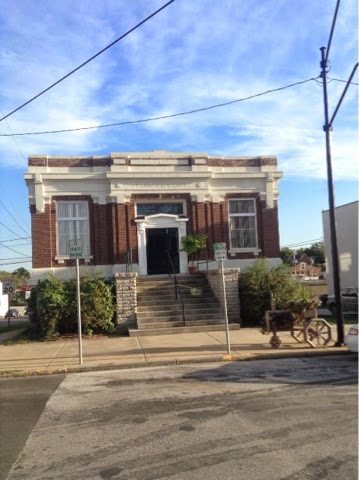Besides their entertainment value, the churches also provide a last resort as a place to camp. They are often off on their own and have no one around, a perfect place to pitch a tent, as I did on the outskirts of Sedalia. The town was a little bigger than I thought. I didn't have enough light to get beyond its outskirts after arriving just in time to photograph its stunning White House of a Carnegie in the waning light.
It was easily the most spectacular building in another town in serious decline, the all too common plight of small town America. A sign along the highway skirting the town pointed towards its "historic downtown." All too often the word "historic" used in this context means "forsaken" or "derelict." I didn't notice a Walmart here to blame for all the closed down businesses and dilapidated buildings. Amazon and the Internet share the lion's share here. The highways are full of a continual stream of UPS and Fedex trucks making deliveries.
About the only businesses that remain are barber shops and beauty salons and Dollar stores and banks and tattoo parlors and liquor stores and resale stores and maybe a pawn shop and an occasional oddity, such as the tanning salon in Warsaw, Missouri aptly called The Fakery.
My route north from Springfield took me over the Missouri River and its neighboring Lewis and Clark Trail. On the way I passed through Bolivar. Its Carnegie now housed the Polk County Genealogical Society. It faced the town's central plaza.
The Carnegie in Fayette still served as the town library.
A sign in front proclaimed the good fortune of Fayette being just one of thirty-three towns in Missouri to have a Carnegie. It was a thousand short though on the number of libraries Carnegie funded around the world.
As with Fayette and Sedalia, I had to detour from the highway to go to Huntsville and its Carnegie, another dandy that still functioned as it was intended.
I pitied the towns I passed through that hadn't taken advantage of the Carnegie offer. They too could have had a distinguished library rather than the plain and dumpy buildings that presently serve the purpose. It wasn't as if Carnegie exhausted his funds. He wanted to give away his entire fortune for the construction of libraries, but didn't even exhaust half of it.






1 comment:
r33Great to read these, George. Now, some of my students are reading them too.
Post a Comment